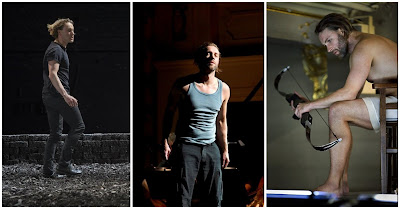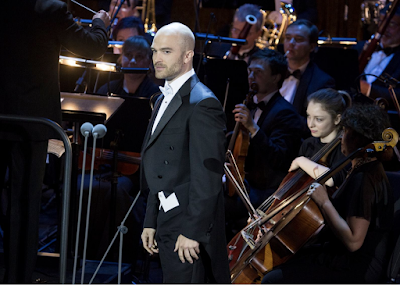 |
| Andreas Bauer Kanabas as Méphisto and Osmin |
Andreas Bauer Kanabas, who took the opera world by storm with his sexy portrayal of Méphisto in Gounods'
Faust in Riga, will be starring as Alfonso d'Este, the Duke of Ferrara in Donizetti's
Lucrezia Borgia.
The performances at the Theatre du Capitole in Toulose runs from January 24-February 3 and the title role will be sung by the thrilling soprano Annick Massis. The remainder of the cast includes fellow bass-barihunk Jérémie Brocard as Don Apostolo, Eléonore Pancrazi as Orsini, Mert Süngü as Gennaro, Thomas Bettinger, Galeano Salas, François Pardailhé, Rupert Grœssinger and Julien Véronèse.
Alfonso I d'Este, Duke of Ferrara, was Lucrezia Borgia's third husband and the marriage was arranged by Pope Alexander VI in early 1502. She had eight children during this marriage and was considered a respectable and accomplished Renaissance duchess, effectively rising above her previous reputation as a unfaithful wife and murderess, and surviving the fall of the Borgias following her father's death.
 |
| Bass-barihunk Jérémie Brocard |
After his run in
Lucrezia Borgia, he will sing Sarastro in Mozart's
The Magic Flute in Australia and New Zealand, Escamillo at the Frankfurt Opera, the title role in Bartók's
Bluebeard's Castle, and then a reprisal of Méphisto a the Latvian Opera in Riga.
He also returns to the Deutsche Oper Berlin in 2019 as King Heinrich in Wagner's
Lohengrin, the role of his debuts at both the Vienna Staatsoper and the New National Theatre in Tokyo. Berlin sees him again in 2020, as Zaccaria in Verdi's
Nabucco. He will also perform Sarastro in Mozart's
The Magic Flute at
Covent Garden.
He recently add "Kanabas" to his name after singing professionally as Andreas Bauer his entire career. He made the change to honor his Bohemian ancestors on my mother’s side of the family, who experienced the perils of
Nationalism despite living peacefully in a multi-cultural area. They
were supporters of theatre and the arts in Ceska Lipa and Prague, and later in Weimar and Erfurt,
Germany and had a profound impact on the singer. Two of his most roles in his repertoire are Vodnik in Czech and
Bluebeard in Hungarian.



















